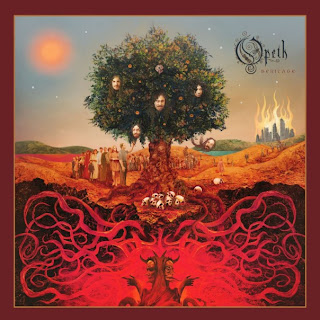It's been three years since Opeth's last release, Watershed. With great anticipation, Sweden's (and possibly all of Metal's) finest, Opeth returns with their tenth studio album Heritage.
It's a pretty significant accomplishment for any band to reach the ten album plateau. By this point, most bands have either given up, broken up, or burnt out. If they are still making music, it is likely formulaic bullshit just to make a few bucks on record sales and kick start another high-priced tour.
Opeth on the other hand, is a band that appears to be constantly evolving, both in terms of their music, and in terms of their lineup. Since 2005, four new members have entered the ranks of Opeth, one of which, Keyboardist Per Wiberg, has since been replaced. You might think that the dude playing keys in a death metal band has little effect on a band's overall sound, but in my experience new band line-ups always result in a band who's sound scape is altered.
Heritage is definitely a unique sounding album, and a definite departure from their previous works. From the melancholy piano intro on the first track, Heritage, it is clear that this album is going to take the listener to new places. Those new places are even more evident on the following track, The Devil's Orchard, a song that serves as a good example of what you can expect from the rest of the album. You might think: with new members comes new influences, new approaches, and the end result: new sounds. However, I would argue that Opeth's new direction is less a product of who is new to the band and more likely due to who is still there.
It seems pretty clear to me that Opeth is fully Mikael Akerfeldt's band, and the rest of the band marches to the beat of his drum. It could be argued that this has been the case for some time, but with additions like Martin Axenrot and Fredrik Akesson, guys with death metal in their blood, I wonder how they feel about the band taking the less heavy road.
The Devil's Orchard makes three things distinctly clear: First off, this is by far Opeth's softest album since Damnation. Secondly, this is most likely Opeth's most progressive, and experimental album yet. Altering time signatures, tempo shifts, and trippy sounds are all in abundance here. Lastly, and maybe the most important factor of them all, is that Heritage is an album completely devoid of the death metal growl. A detail the metal lover in me had a hard time coping with.
That said, it is really only on the first few listens that the death metal growl is missed. Once I had a better taste for the album, and I had adjusted to it's sound, it became pretty clear that there really is no place for the growl on the album. This set of compositions is truly much better served by Mikael Akerfeldt's liquid honey vocals. For a guy who can deliver some beastly growls, he really does have a beautiful singing voice. That voice does have it's limits though. There are times when Akerfeldt sings high, with less than great sounding results. Still, for this set of songs, the clean lyrics work well in harmony with the music.
Instrumentally, Heritage breaks new ground for the band. Not only is it softer than most of their previous output -look no further than the lovely guitar riff intro to I Feel the Dark- it also features some musical elements not often used by a metal band. Aside from the occasional acoustic guitar, you'll also find some stand-up bass, hand percussion djembes and congas, and in the case of Famine, a healthy dose of some flute. These elements all serve to prove the fact that Opeth has taken a much more progressive and experimental approach with Heritage.
For the most part, Opeth's new approach makes for some beautiful music, but at other times, the band goes a bit overboard with the progressive elements and, as is the case on Slither, wanders into the danger zone of rhythm damning avant-garde nonsense. While The Devil's Orchard is a great example of progressive metal done well, complete with time changes, and tempo shifts, it never stops being a good song with it's roots firmly planted in metal soil. Slither on the other hand, takes the progressive elements to the extreme and becomes an incomprehensible mish-mash of buzzing, swirling sounds that barely resembles music. Maybe this is a case of the listener needing more time to acquire an appreciation for the unique sound, but I'm more inclined to say Slither is a dud. When a band takes a new approach to music and explores new avenues, one dud out of ten isn't too bad, and Heritage delivers 57+ minutes of mostly wonderful music.
There will definitely be some fans out there disappointed with Opeth's new sound, and while some may say this album is just a departure, I get the feeling that Clean Vocals Progressive Metal-land is now Opeth's permanent residency. Heritage is an album I initially struggled to enjoy, but it is an album that continues to grow on me with each listen. I definitely prefer Heritage to the band's previous effort, Watershed, but I still find myself preferring their earlier, heavier albums. Overall, an impressive effort, far superior to just about everything else in the music industry, but in terms of what I look for in an Opeth album, I'm left wanting a bit more.
Grade: C+

No comments:
Post a Comment